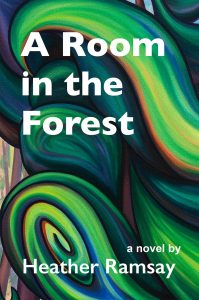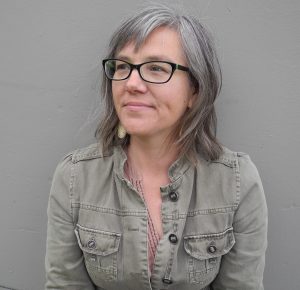Quests and complications
A Room in the Forest
by Heather Ramsay
Qualicum Beach: Caitlin Press, 2025
$25.00 / 9781773861678
Reviewed by Candace Fertile
*

It’s 1999, and nineteen-year-old Lily leaves her home in Alberta to take a forestry job in Haida Gwaii in Heather Ramsay’s debut novel. Ramsay infuses the book with local colour, and as she lived there for ten years, it’s clear she has a firm grasp of the landscape. Haida Gwaii comes across as a remarkable beautiful place.
Of course, it’s also a place that has been fraught with cultural, economic, and environmental challenges. On her drive to her new job, Lily meets a group of tree planters who befriend her and try to educate her a bit on some of the issues (not using the term “Queen Charlotte Islands,” for example). The tree planters, especially Sissy, demonstrate consummate virtue signaling and moral superiority. Early on in the novel Ramsay delivers a set piece with the tree planters and Lily in a pub. The bartender loathes the tree planter “hippies” and makes fun of Lily’s naive request for a “Traditional Ale,” saying, “Most people drink Molson’s in here.” Class consciousness is another division.
Lily is driven by her desire to escape life in her family’s furniture store in a small town. She realizes she has a lot to learn, and that is an endearing quality. She loves trees and feels a pull to Haida Gwaii perhaps because her mother had gone there before she was born. Her job in a logging company puts her at odds with the tree planters who later resurface in her life, and it also makes her wonder about the value of her occupation as a forest technologist. But she works hard, trying to follow directions that are often designed to make her fail. She struggles with the challenging terrain of the forest while loving it. She really wants to belong some place, to find “a room in the forest.”

The main thread of the plot is a search for identity. Lily’s mother Arlene left the family when Lily was fifteen and her brother was nine. Arlene took off with another man; when she reappears, her concern for her children isn’t quite believable. It isn’t a surprise that she wants Brian to sell the store and give her half of the proceeds. Ramsay tries to portray Arlene as a concerned mother, but too much time has passed, and Arlene’s interest in money detracts from any pure notion of maternal love. The most genuine relationship is that between Lily and her brother, but they are at different points in their lives. Lily’s courage in leaving home to take a job where she knows no one is evidence of her strength and desire to find herself and create her own path in life.
To further the family issues, one of Lily’s co-workers, Chaz, is a young man whose Haida mother disappeared years ago. His white father is his boss. Chaz is split between the Haida and white worlds, and like Lily he wants to fashion his own life. The plot gallops from problem to problem in a series of vignettes as these young people try to negotiate their world and their place in it. The personal stories of Lily and Chaz parallel each other in many ways. Just as Lily wants to flee her small town, Chaz wants to get away from Haida Gwaii. Young people who want to explore something new rings true, even while they have connections to what they want to leave.
Numerous other characters populate the novel. One of the most annoying is a woman named Renée who works in the camp kitchen. Renée knows a lot about the past but refuses to divulge it. And her accented voice is painfully recorded. She tells Lily the place is dangerous: “De forest. De storms. De men who don’t know how to tie down tings.” But her information remains tantalizingly cryptic, in part because she’s often stoned or drunk. A fascinating character named Walker is a hermit. Lily wants to find him. She thinks she has seen him in the forest, and he is known to the community but not as an individual, more as a ghost. By the end of the novel many of the characters are linked by much more than just being in the same place, and the level of coincidence will be perceived by some readers as high.
Because the setting is Haida Gwaii there are fragments of Haida culture and stories. In her Acknowledgements, Ramsay notes “I am also aware of concerns around a person of settler descent writing from a Haida perspective…. I sincerely hope my portrayal of Chaz, his gran, his uncle and others will be received with the generosity and love that I respectfully tried to imbue into them.” It’s a complicated issue.
Overall, this novel has so much going on that it can be hard to follow. It’s like a spider web of connections. The best aspects are the details of the flora and fauna supplied by Larry, one of the Totem Timber workers who is tough and cranky but knowledgeable. He tries to teach Lily, and to her credit, she wants to learn. More focus on nature would be welcome.

*

Candace Fertile has a PhD in English literature from the University of Alberta. She teaches English at Camosun College in Victoria, writes book reviews for several Canadian publications, and is on the editorial board of Room Magazine. [Editor’s note: Candace has reviewed books by Leslie Shimitakahara, Hannah Calder, M.V. Feehan, S.C. Lalli, Rebecca Godfrey with Leslie Jamison, Ian and Will Ferguson, Shashi Bhat, Carleigh Baker, Kathryn Mockler, Lucia Frangione, Darcy Friesen Hossack, Robin Yeatman, Emi Sasagawa, Patti Flather, Peter Chapman, Janie Chang, Pauline Holdstock, Ava Bellows, Beth Kope, Geoff Inverarity, and Angélique Lalonde for BCR.]
*
The British Columbia Review
Interim Editors, 2023-26: Trevor Marc Hughes (non-fiction), Brett Josef Grubisic (fiction and poetry)
Publisher: Richard Mackie
Formerly The Ormsby Review, The British Columbia Review is an online book review and journal service for BC writers and readers. The Advisory Board now consists of Jean Barman, Wade Davis, Robin Fisher, Barry Gough, Hugh Johnston, Kathy Mezei, Patricia Roy, and Graeme Wynn. Provincial Government Patron (since September 2018): Creative BC. Honorary Patron: Yosef Wosk. Scholarly Patron: SFU Graduate Liberal Studies. The British Columbia Review was founded in 2016 by Richard Mackie and Alan Twigg.
“Only connect.” – E.M. Forster